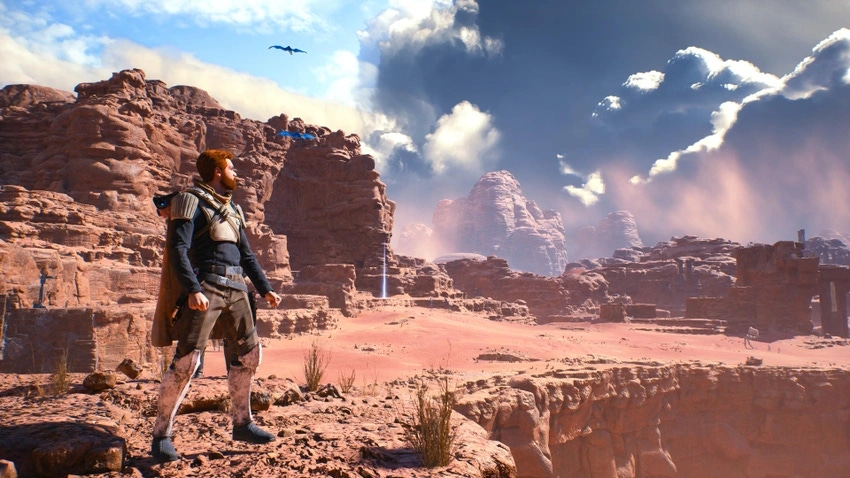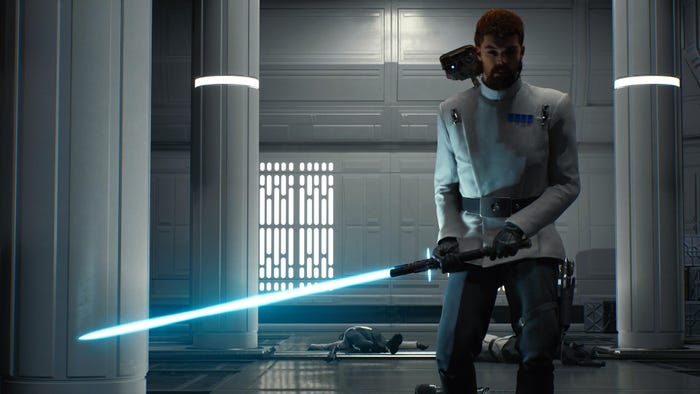Trending
Opinion: How will Project 2025 impact game developers?
The Heritage Foundation's manifesto for the possible next administration could do great harm to many, including large portions of the game development community.

Read More from GDC 2024 | Keep up with the latest game industry event coverage from GDC 2024, including news, talks, interviews, and more from the Game Developer team.
Subtle changes to Star Wars: Jedi Survivor's Force meter made Cal Kestis' brush with the Dark Side more impactful.

Spoiler Warning: This article discusses a key dramatic moment toward the end of Star Wars Jedi: Survivor.
At the beginning of their presentation on creating key narrative moments in Star Wars: Jedi Survivor, lead writer Daniel Homan and senior encounter designer Patrick Wren took a moment to explain their passion for the Star Wars saga, with Homan referring to it as depicting "the classic fight between good and evil."
Homan had made that reference in allusion to the fact that Jedi Survivor's tale is about how "the fight between good and evil" becomes internalized for the game's characters, who are living through what is sometimes referred to as "The Dark Times" set between Episode III: Revenge of the Sith, and Episode IV: A New Hope.
It's a setting where the Galactic Empire has risen to power, and the cast of Jedi: Survivor has to fight tooth and claw just to survive, with no hope of stopping evil in its tracks.
"The fight between good and evil" doesn't fully cover what Homan described. Star Wars' depiction of that conflict has stood the test of time because it's also a story about evil urging good to give into their most selfish instincts and come over to its side. In Episode VI: Return of the Jedi, Luke Skywalker resists that temptation and casts aside his weapon rather than killing his own father to save the galaxy.
In Revenge of the Sith, Anakin Skywalker gives in, and the hero of the Galactic Republic becomes the murderous enforcer of the fascist Empire.
Toward the end of Jedi Survivor, player character Cal Kestis faces that same temptation when hunting the man who betrayed his friends. With his mentor dead, and his dream of saving Jedi survivors threatened, Kestis infiltrates an Imperial space station to confront his former friend Bode Akuna. He only briefly stays his hand after learning Bode did his dark deeds to protect his daughter.
But Bode escapes and Cal chases after him, anger flowing to the forefront. What follows is a setpiece where Respawn invites the player to join in Cal's rage, changing the "Force Slow" ability to one that activates the Dark Side and enable a mass slaughter of Imperial troopers standing in his way..
According to Wren, it took a lot of effort to make this scene work, and it only came together after the team made one subtle manipulation of a key game mechanic: the player's Force meter.
The Force meter in Jedi Survivor is meant to symbolize how Cal taps into the fabled power that binds the universe together. Confining an all-powerful, heavily spiritual presence into a mere power bar has some ludonarrative awkwardness (not dissonance) but Wren said it was an invaluable tool for Cal's brush with darkness.
Managing the meter's power is a key combat mechanic throughout Jedi Survivor. Letting it drop too low makes it impossible to use certain abilities, but the player can either acquire powers that extend its length or make rejuvenating it mid-combat an easier task. Cal can't draw on the Force as easily as his mentor Cere Junda or powerful villains like Darth Vader because he's not as skilled in connecting to it as they are.
That brings us to Cal's brush with darkness. When first designing Cal's rampage, Wren explained that the team's first instinct was to have players activate their new ability, tap into the Dark Side, and enter an infinite rage. The hope was that turning this power fantasy moment into something emotionally tragic would sell the temptation Cal feels to give into his rage.
It didn't work right away. "The tension intensity level was just flat through this whole experience," Wren admitted. "Even in a moment like this, you still have pacing, and still need to make sure that what you're trying to deliver reacts that way."
This sequence is also one with the highest number of enemies onscreen in the entire game. No number of them could solve the pacing issues without interfering with the power fantasy using the Dark Side is supposed to convey.
The solution was just to revisit the Force meter. Cal's Dark Side rage was tweaked so that it consumed Force from the meter like any other ability, and would fade away when it was empty. But in this rampage, the meter passively fills up, something it never does anywhere else in the game.
"That's to represent Cal's anger that he's going through, but it fills a gameplay purpose as well," Wren said.

Image via Respawn/Electronic Arts.
There's a rhythm that builds with the scene now that the ability and Force meter properly interact. Cal begins his rampage, but then the power fades away. Imperial troops swarm his path in numbers that would be impassable in general gameplay.
Cal's meter fills up passively and through these short bursts of regular combat, and with a roar of anger, he's ready to tap into the Dark Side's power again.
With this flow established, Wren and his colleagues could better pace out the encounter, drawing players in and helping them comprehend the power of the Dark Side.
Only the words of Merrin, a fellow Force user who had her own brush with darkness in Jedi: Fallen Order, can bring him back toward the light—but still changed by how close he came to embracing his rage.
Say the word "power fantasy" in game design and you're generally referring to the idea of gifting players abilities they wouldn't have in real life and letting them rise to dominance in a video game space. It's useful for combat games but sometimes critiqued as limiting what's possible in storytelling and mechanics.
But thanks to the work Wren, Homan, and their peers did, the idea is given new life in Jedi: Survivor. The game's biggest "power fantasy" moment, where players can rampage through everything in their path, is explicitly framed as tapping into the hero's darkest instincts.
In the rest of the game, combat is a constant struggle. Even a joke boss named "Rick the Door Technician" managed to defeat 489 players as of June 2023, a kill count that surely has risen in the months since then.
Contrasting that struggle with the ease of a Dark Side-fueled mass murder (and also the ease and grace players possess in another setpiece where they control the serene master Cere Junda), reinforces the message about good, evil, and the power of temptation, that lies the heart of the Star Wars saga.
Game Developer and Game Developers Conference are sibling organizations under Informa Tech
You May Also Like